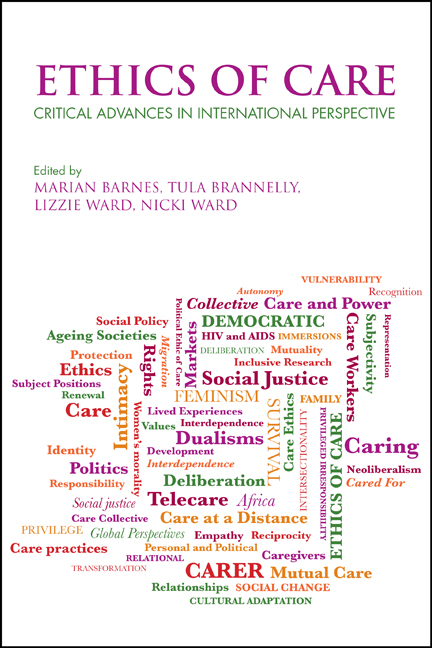Seven - Privilege and responsibility in the South African context
Published online by Cambridge University Press: 08 March 2022
Summary
Introduction
This chapter has as its goal a focus on recognising how, both historically and currently, privilege, responsibility and privileged irresponsibility, all central notions of the political ethics of care, can be used to understand political, economic and cultural issues in the South African context. Although the chapter focuses on the South African context in particular, the understandings generated by an analysis of privileged irresponsibility with respect to the politics of gender, race, generation and class can easily be applied to other geopolitical contexts. The chapter is divided into three main parts. The first section focuses on the notions of privilege, responsibility and privileged irresponsibility and examines how it is possible to maintain privilege and privileged irresponsibility, using Plumwood's (1993; 2002) notion of dualisms. The second section provides South African examples of how privileged irresponsibility can be used to analyse historical and current power dynamics across race, class and gender by focusing on the social work curriculum. The third part of the chapter looks at how it is possible to act on privileged irresponsibility, by examining some South African examples of this. The discussion and conclusion provide some recommendations of how privileged irresponsibility may be addressed.
Privilege, responsibility and privileged irresponsibility
Privilege has been defined by various authors as unearned social and structural advantages which benefit dominant groups or those who occupy positions of power in society, at the expense of marginalised groups (McIntosh, 2010; Pease, 2010, 2011; Wiggan, 2011; Sensoy and DiAngelo, 2012). These conditions are generally taken for granted, invisible and normalised in society, and privilege is thus an unmarked status, rarely recognised, particularly by those who benefit from it. The should be enjoyed by all parties, as they would be in a just society, but which are restricted to those with a dominant status in unequal societies (Tronto, 1993; Schiele, 1996; Swigonski, 1996; Hardy, 2001; Sullivan, 2006; McIntosh, 2010; Pease, 2010; Wiggan, 2011; Sensoy and DiAngelo, 2012; Sholock, 2012).
As Swigonski (1996) notes, privileges make people feel at home in the world and take for granted that they are the centre of their world where social, political, economic and other resources are available. Exclusion, on the other hand, de-centres or marginalises individuals who have less access to such resources.
- Type
- Chapter
- Information
- Ethics of CareCritical Advances in International Perspective, pp. 83 - 94Publisher: Bristol University PressPrint publication year: 2015



